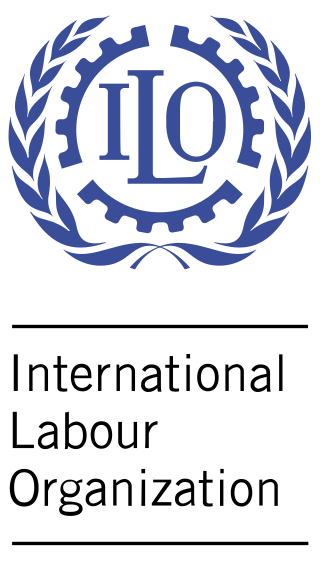Related Research Articles

The International Labour Organization (ILO) is a United Nations agency whose mandate is to advance social and economic justice by setting international labour standards. Founded in October 1919 under the League of Nations, it is one of the first and oldest specialised agencies of the UN. The ILO has 187 member states: 186 out of 193 UN member states plus the Cook Islands. It is headquartered in Geneva, Switzerland, with around 40 field offices around the world, and employs some 3,381 staff across 107 nations, of whom 1,698 work in technical cooperation programmes and projects.

The International Chamber of Commerce is the largest, most representative business organization in the world. Its over 45 million members in over 100 countries have interests spanning every sector of private enterprise.
Human security is a paradigm for understanding global vulnerabilities whose proponents challenges the traditional notion of national security through military security by arguing that the proper referent for security should be at the human rather than national level. Human security reveals a people-centred and multi-disciplinary understanding of security which involves a number of research fields, including development studies, international relations, strategic studies, and human rights. The United Nations Development Programme's 1994 Human Development Report is considered a milestone publication in the field of human security, with its argument that ensuring "freedom from want" and "freedom from fear" for all persons is the best path to tackle the problem of global insecurity.

Peace and conflict studies or conflict analysis and resolution is a social science field that identifies and analyzes violent and nonviolent behaviors as well as the structural mechanisms attending conflicts, with a view towards understanding those processes which lead to a more desirable human condition. A variation on this, peace studies (irenology), is an interdisciplinary effort aiming at the prevention, de-escalation, and solution of conflicts by peaceful means, thereby seeking "victory" for all parties involved in the conflict.

The Carnegie Corporation of New York is a philanthropic fund established by Andrew Carnegie in 1911 to support education programs across the United States, and later the world.

Decent work is employment that "respects the fundamental rights of the human person as well as the rights of workers in terms of conditions of work safety and remuneration. ... respect for the physical and mental integrity of the worker in the exercise of his/her employment."
Gender mainstreaming is the public policy concept of assessing the implications for people of different genders of a planned policy action, including legislation and programmes. Mainstreaming offers a pluralistic approach that values the diversity among people of different genders.

Juan Somavía Altamirano is the former Director-General of the International Labour Organization (ILO). He was elected to serve as the ninth Director-General of the ILO by the Governing Body on 23 March 1998. On 7 November 2013, he was appointed by UN Secretary-General Ban Ki-moon to serve as Special Adviser on Interregional Policy Cooperation.

Harlan Cleveland was an American diplomat, educator, and author. He served as Lyndon B. Johnson's U.S. Ambassador to NATO from 1965 to 1969, and earlier as U.S. Assistant Secretary of State for International Organization Affairs from 1961 to 1965. He was president of the University of Hawaii from 1969 to 1974, president of the World Academy of Art and Science in the 1990s, and Founding dean of the University of Minnesota's Hubert H. Humphrey Institute of Public Affairs. Cleveland also served as dean of the Maxwell School of Citizenship and Public Affairs at Syracuse University from 1956 to 1961.

The United Nations Peacebuilding Commission (PBC) is a United Nations intergovernmental advisory body of both the General Assembly and the Security Council that supports peace efforts in conflict affected countries. A key addition to the capacity of the international community in the broad peace agenda, it was established in 2005 with the passage of both A/RES/60/180 and S/RES/1645 Mr. Ivan Šimonović (Croatia) is the incumbent chair of PBC.
The International Commission on Peace and Food (ICPF) was formed in 1989 as a private non-governmental initiative to bring an end to the arms race and thereby redirect the monetary resources of the world for accelerating global economic development.

The World Academy of Art and Science (WAAS), founded in 1960, is an international non-governmental scientific organization and global network of more than 800 scientists, artists, and scholars in more than 90 countries.
Social development theory attempts to explain qualitative changes in the structure and framework of society, that help the society to better realize aims and objectives. Development can be defined in a manner applicable to all societies at all historical periods as an upward ascending movement featuring greater levels of energy, efficiency, quality, productivity, complexity, comprehension, creativity, mastery, enjoyment and accomplishment. Development is a process of social change, not merely a set of policies and programs instituted for some specific results. During the last five centuries this process has picked up in speed and intensity, and during the last five decades has witnessed a marked surge in acceleration.

The IBSA Dialogue Forum is an international tripartite grouping for promoting international cooperation among these countries. It represents three important poles for galvanizing South–South cooperation and greater understanding between three important continents of the developing world namely, Africa, Asia, and South America. The forum provides the three countries with a platform to engage in discussions for cooperation in the field of agriculture, trade, culture, and defence among others.
The Mother's Service Society is a non-governmental, educational and social science research institute established at Pondicherry, India in 1970. MSS conducts research on a wide range of activities related to social and economic development, social science research, education and public policy formulation. The Society’s current research activities focus on social development theory, economics, employment, business management, agricultural development, alternative education, global governance, peace & security, literary criticism, psychology and applied spirituality based on a conceptual framework derived from theory of creation and evolution of consciousness propounded by Indian philosopher Sri Aurobindo. MSS is recognized as a Center of Excellence of the World Academy of Art & Science.

The United Nations University Institute for Sustainability and Peace (UNU-ISP) was an institute of the United Nations University (UNU), a think tank for the United Nations system which provides a bridge between the UN and the international academic and policy-making communities. UNU-ISP is based at UNU headquarters in Tokyo, Japan, with an Operating Unit located in Germany.
Garry Jacobs is an American writer, social thinker, researcher and consultant on the topics of business management, economic and social development, and global governance. He is the President and CEO of the World Academy of Art & Science; chairman of the board and CEO of the World University Consortium; Managing Editor of Cadmus Journal; President of The Mother’s Service Society; Distinguished Professor of Interdisciplinary Studies at the Person-Centered Approach Institute, Italy; executive director of the International Center for Peace and Development in Napa, California; and a full member of the Club of Rome.

The Post-2015 Development Agenda was a process from 2012 to 2015 led by the United Nations to define the future global development framework that would succeed the Millennium Development Goals. The new framework, starting from 2016 is called Sustainable Development Goals.
United Nations General Assembly Resolution 30/3520 (XXX.) was a resolution adopted by the UN General Assembly on 15 December 1975. The resolution adopted the World Plan of Action and related resolutions from the International Women's Year World Conference on Women which was held in Mexico City earlier in the year.

Shahrbanou Tadjbakhsh is an Iranian-American researcher, university lecturer, and United Nations consultant in peacebuilding, conflict resolution, counter-terrorism, and radicalization, best known for her work in "Human Security" and for contributions in the republics of Central Asia and Afghanistan, as cited by the New York Times and other publications as well as hundreds of scholarly publications. Currently, she is a lecturer at Sciences Po, researcher, and consultant to the United Nations.